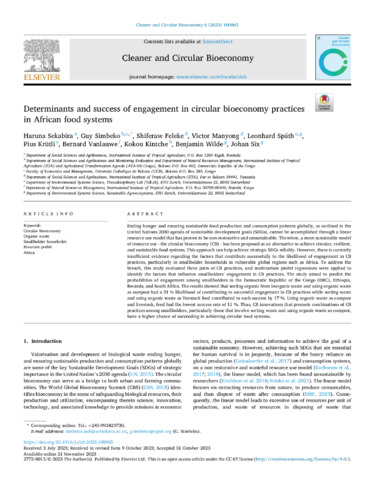Determinants and success of engagement in circular bioeconomy practices in African food systems
Abstract
Ending hunger and ensuring sustainable food production and consumption patterns globally, as outlined in the United Nations 2030 agenda of sustainable development goals (SDGs), cannot be accomplished through a linear resource use model that has proven to be non-restorative and unsustainable. Therefore, a more sustainable model of resource use - the circular bioeconomy (CB) - has been proposed as an alternative to achieve circular, resilient, and sustainable food systems. This approach can help achieve strategic SDGs reliably. However, there is currently insufficient evidence regarding the factors that contribute successfully to the likelihood of engagement in CB practices, particularly in smallholder households in vulnerable global regions such as Africa. To address the breach, this study evaluated three pairs of CB practices, and multivariate probit regressions were applied to identify the factors that influence smallholders' engagement in CB practices. The study aimed to predict the probabilities of engagement among smallholders in the Democratic Republic of the Congo (DRC), Ethiopia, Rwanda, and South Africa. The results showed that sorting organic from inorganic waste and using organic waste as compost had a 31 % likelihood of contributing to successful engagement in CB practices while sorting waste and using organic waste as livestock feed contributed to such success by 17 %. Using organic waste as compost and livestock, feed had the lowest success rate of 11 %. Thus, CB innovations that promote combinations of CB practices among smallholders, particularly those that involve sorting waste and using organic waste as compost, have a higher chance of succeeding in achieving circular food systems.

